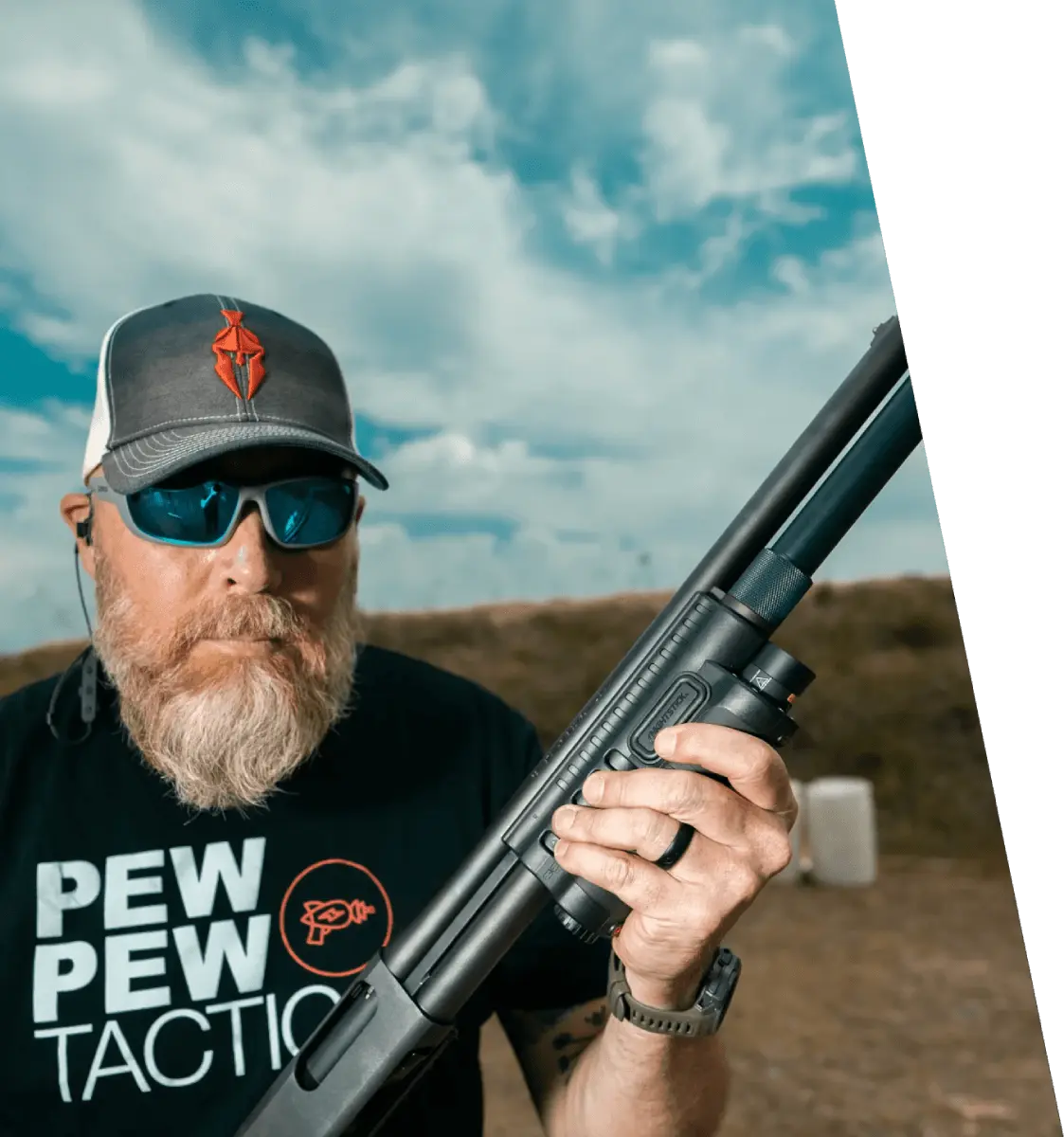Last Updated: July 15, 2025
Disclaimer: While the information provided here is legal in nature, it is not to be construed as legal advice and is for educational and entertainment purposes only.

Introduction
Alabama represents the quintessential American gun owner experience. Buying, owning, and using a gun in the Yellowhammer State is easier than almost anywhere in the country. Keep up the great work, Alabama!
Of course, no state is perfect, so we’ll go over all you need to know about buying and using firearms in Alabama.
Table of Contents
Loading...
Snapshot Summary
- Permit to Own/Purchase a Firearm: No
- Permit to Own/Purchase Ammunition: No
- Firearm Registration Requirements: No
- Firearm Restrictions/Bans: No
- Magazine Restrictions/Bans: No
- Other Restrictions/Bans: No
- Safe Storage Laws: No
- Concealed Carry: Yes, Shall Issue/Constitutional Carry
- Open Carry: Yes
- Castle Doctrine: Yes
- Stand Your Ground Laws: Yes
- Duty to Retreat: No
Before We Get Started
Probably Alabama’s biggest gun law quirk is that the state requires you to be 19 (not 18 or 21) to purchase or carry a handgun in public. The state also bans long guns disguised as walking canes.
Gun Ownership Laws
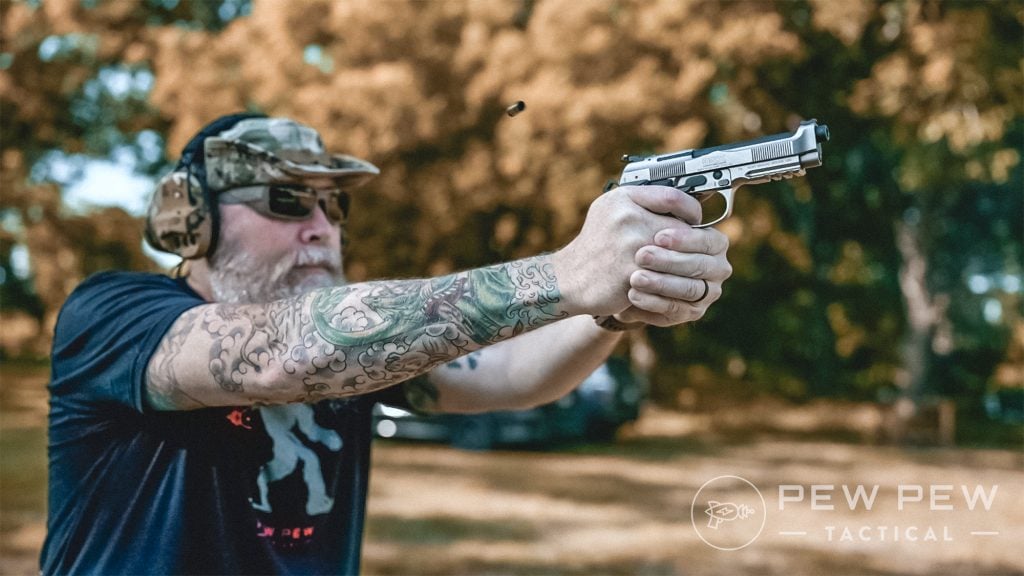
In Alabama, you may not purchase, own, or possess a gun if you:
- Are a fugitive from justice
- Are illegally or unlawfully in the United States
- Are in the United States on a non-immigrant visa
- Were dishonorably discharged from the U.S. military
- Have renounced your U.S. citizenship
- Unlawfully use or are addicted to any controlled substance
- Have been adjudicated as a “mental defective,” have been committed to any mental institution, or are a person of unsound mind
- Have been convicted of or are under indictment for:
- Any crime punishable by imprisonment for a term exceeding one year
- An act that would constitute a felony if committed in Alabama
- A misdemeanor crime of domestic violence (unless the misdemeanor involved no force or threats of force)
- Are subject to a protective order that prohibits gun possession
- Have been convicted of committing or attempting to commit a:
- Violent crime
- Domestic violence misdemeanor
- Are a habitual drunkard
- Are subject to a valid domestic abuse restraining order
Not sure what constitutes a violent crime? According to Alabama law, violent crimes include:
- Murder
- Manslaughter
- Gang membership
- Kidnapping
- Rape
- Sodomy
- Sexual abuse or sexual torture
- Sexual crimes against children and minors (including online)
- Stalking
- Domestic violence
- Burglary and robbery
- Arson
- Criminal possession of explosives
- Extortion
- Terrorism, terrorist threats, or hindering prosecution for terrorism
- Violent escape from legal custody
- Intimidating a witness or juror
- Treason
- Illegally discharging a firearm in an enclosed space (car, building, etc.)
- Promoting prostitution
- Human trafficking
- Child or elder abuse
- Hindering felony prosecutions
- Any similar crime committed in another jurisdiction
Underage Gun Ownership
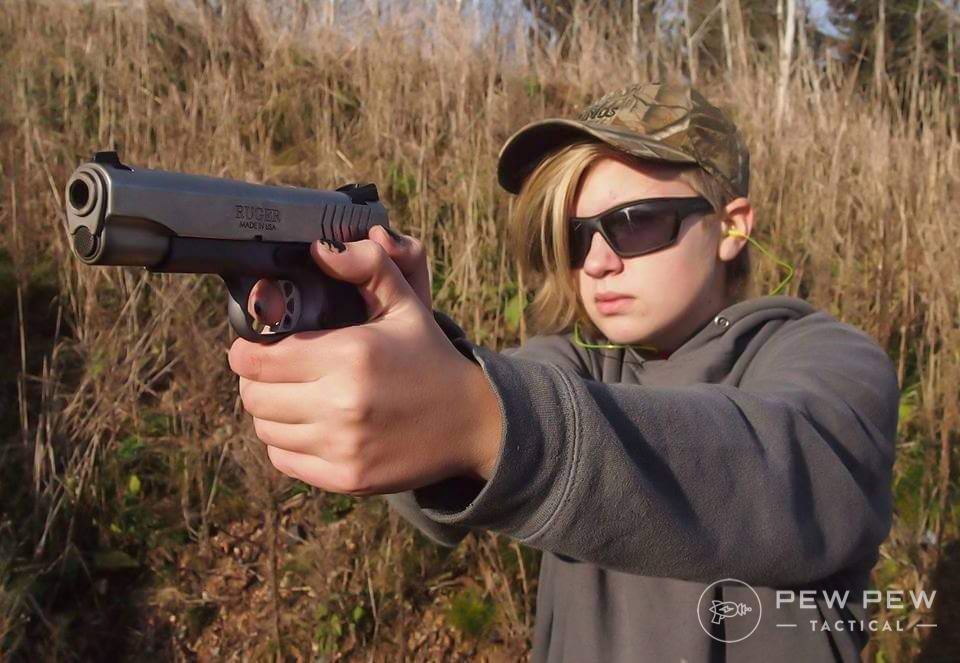
Alabama does not place an age limit on the possession of long guns.
If you are an Alabama resident under 21, you may use a handgun if your parent or legal guardian, who is legally allowed to own the handgun, gives you permission and you are:
- Attending a hunter education course or firearms safety course
- Practicing or target shooting at a shooting range
- Participating in a competition or performance that uses firearms
- Hunting or fishing with a valid license and with the permission of the landowner, if the handgun is carried openly and easy to see
- On property owned by your parent, legal guardian, or grandparent
- Traveling by car to any of the activities above, if the gun is unloaded and locked in a compartment or container out of reach to the people in the car
- A member of the armed services or National Guard and acting in the line of duty
You are also legally permitted to use a handgun with or without supervision if you are acting in self-defense or defending someone else against an intruder in your residence or a residence where you are a guest.
Safe Storage & Child Access Prevention Laws
Alabama law does not require firearms to be stored in any particular manner. That said, please use common sense and keep your guns inaccessible to untrained children and irresponsible adults.
Firearm Registration Requirements
Alabama does not require gun owners to register their firearms.
Restrictions and Bans
Alabama does not restrict or ban ownership of any firearms/firearm types, magazines, or accessories except those already banned or restricted by federal law.
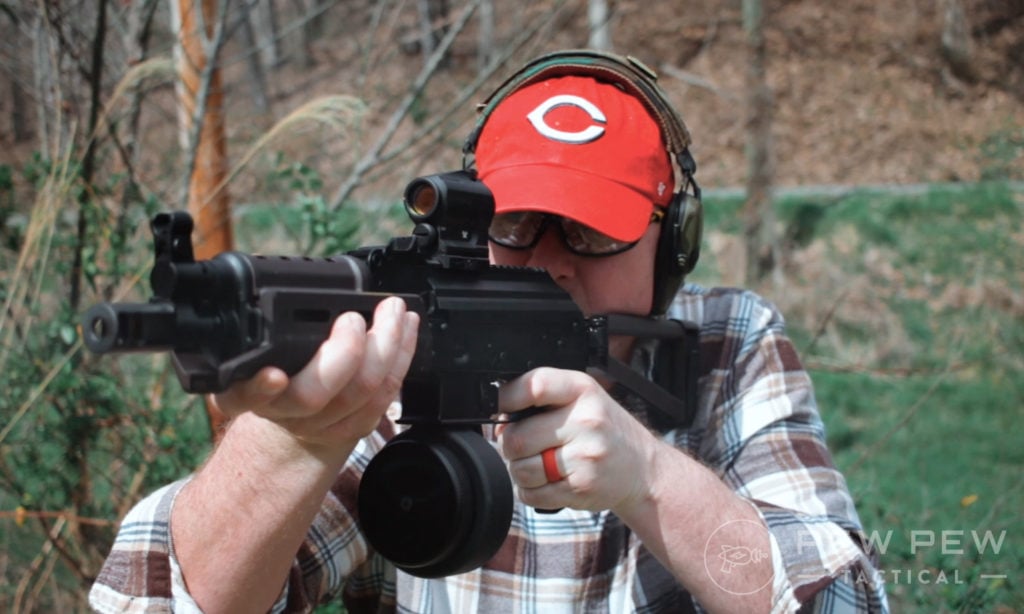
If you want an AR-15 with a 50-round drum magazine, a bump stock, AND a forced reset trigger, the only laws holding you back are the laws of physics.
Purchasing a Gun
Dealer Purchasing
Once you meet all legal requirements for gun ownership, buying a firearm from your local Alabama gun store is as easy as it gets anywhere in the country.
Buying a handgun
To buy a handgun in Alabama, you must
- Be 21 or older
- Provide a state-issued driver’s license
- Submit to an instant background check
Buying a long gun
To buy a long gun, you must:
- Be 18 or older
- Provide a state-issued driver’s license from any state
- Submit to an instant background check
You can buy any long gun (that isn’t prohibited by federal law) except for long guns contained in or disguised as a walking cane.
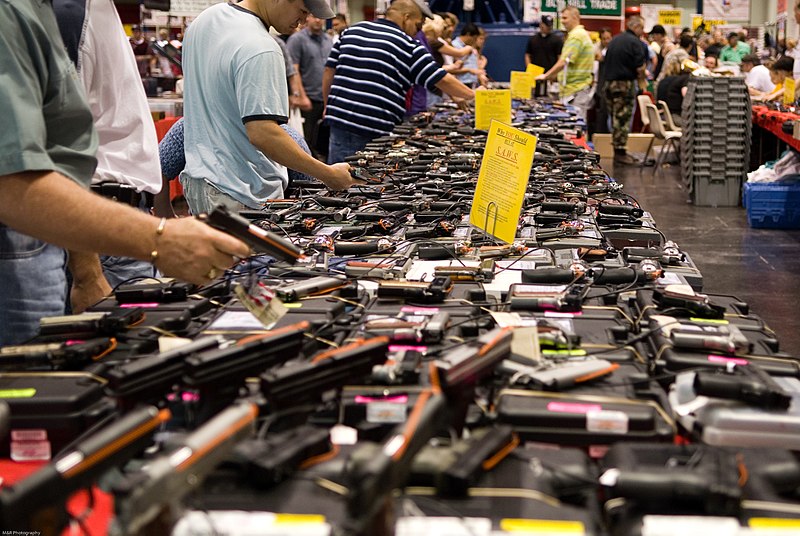
Private Sales
Private gun sales and transfers are almost completely unrestricted in Alabama. No background checks are necessary; however, it is illegal to transfer ownership of a handgun to anyone you believe is:
- A minor
- A violent offender
- A domestic abuser
- A drug addict
- A habitual drunkard
- Mentally unstable
- Subject to a valid protection order for domestic abuse.
Military
Federal law requires licensed firearms dealers to accept PCS orders and a military ID as the equivalent of a state driver’s license or state ID in the state where you are stationed. Alabama does not have any perks or extra requirements for military members who wish to buy a gun.
Antiques and Heirlooms
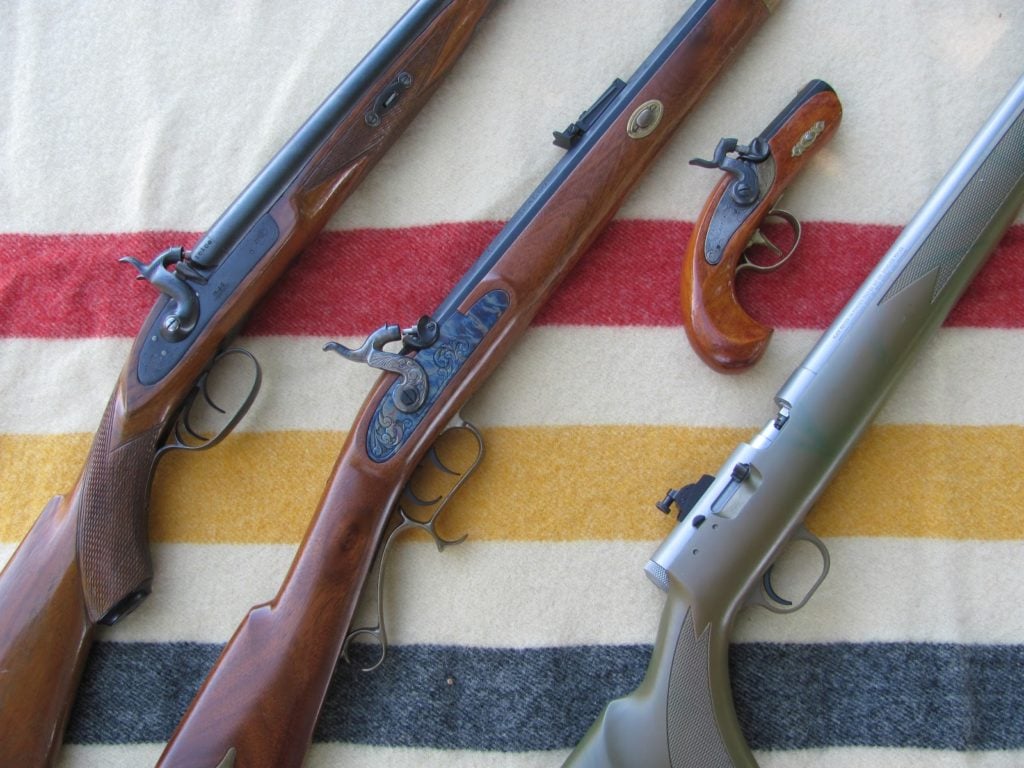
Alabama has no special laws or regulations for antique firearms. State law defines an antique firearm as any matchlock, flintlock, percussion cap, or similar firearm manufactured before 1899 or a replica of such firearm that:
- Is not designed or redesigned for using rimfire or conventional centerfire fixed ammunition
- Uses rimfire or conventional centerfire fixed ammunition that either is no longer manufactured in the US or is not readily available on the US market.
Pistols considered “curiosities or ornaments” are classified as antique pistols under state law. As long as these pistols are not carried concealed on your person, they are unregulated just like any other antique firearm.
Purchasing Ammo
Alabama has no restrictions on who can legally purchase ammunition. The state’s only ammo prohibitions are on the sale and possession of brass or steel Teflon-coated handgun rounds designed to penetrate bulletproof vests.
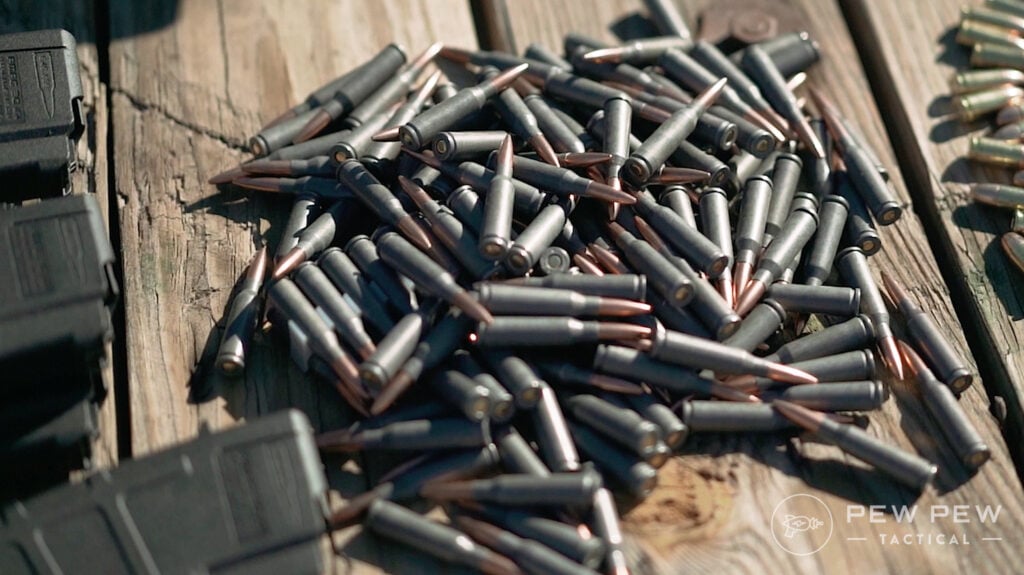
Concealed Carry & Open Carry
Alabama is an incredibly gun-friendly state. On January 1, 2023, constitutional carry went into effect for anyone 18 or older. This applies to both open and concealed carry and covers both residents and non-residents who abide by both state and federal gun laws.
Open Carry
On the state level, Alabama generally permits open carry of a firearm, although you must be at least 19 to carry. (Obtaining a handgun at this age will be a challenge.)
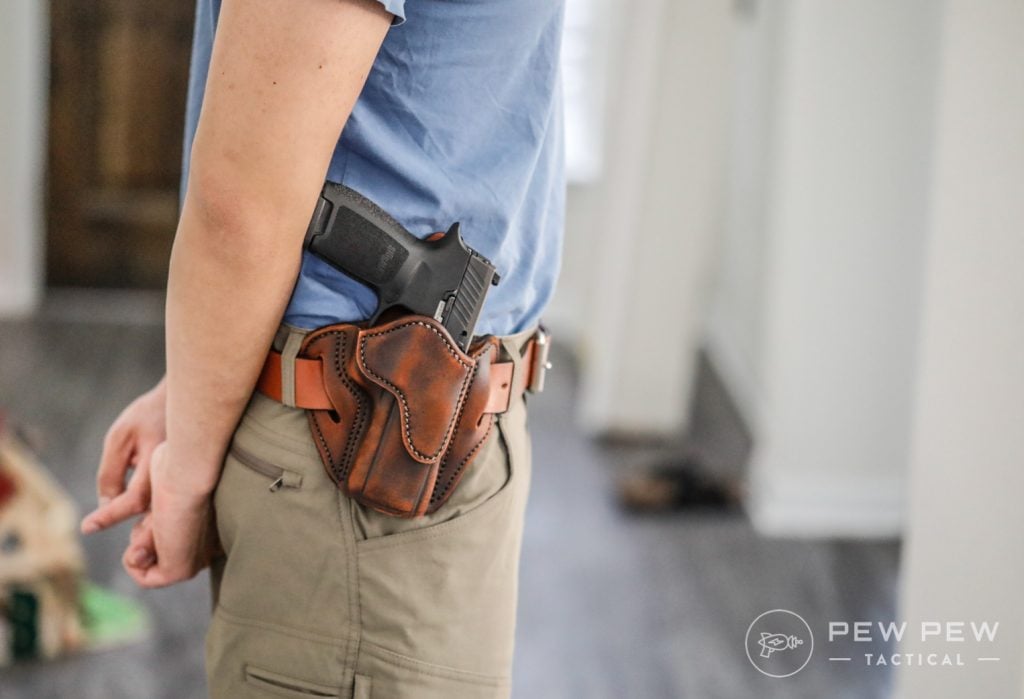
Alabama law specifically says that carrying a gun in a holster (or other secured manner) does not constitute disorderly conduct. Since holsters are also the safest, most secure way to open carry, we highly recommend buying a holster instead of sticking a gun in your waistband.
Concealed Carry
Alabama’s constitutional carry law negates the need for most state residents to carry concealed. That said, a concealed carry permit (Pistol Permit) is worth it if you travel to other states that require a concealed carry permit and have reciprocity with Alabama.
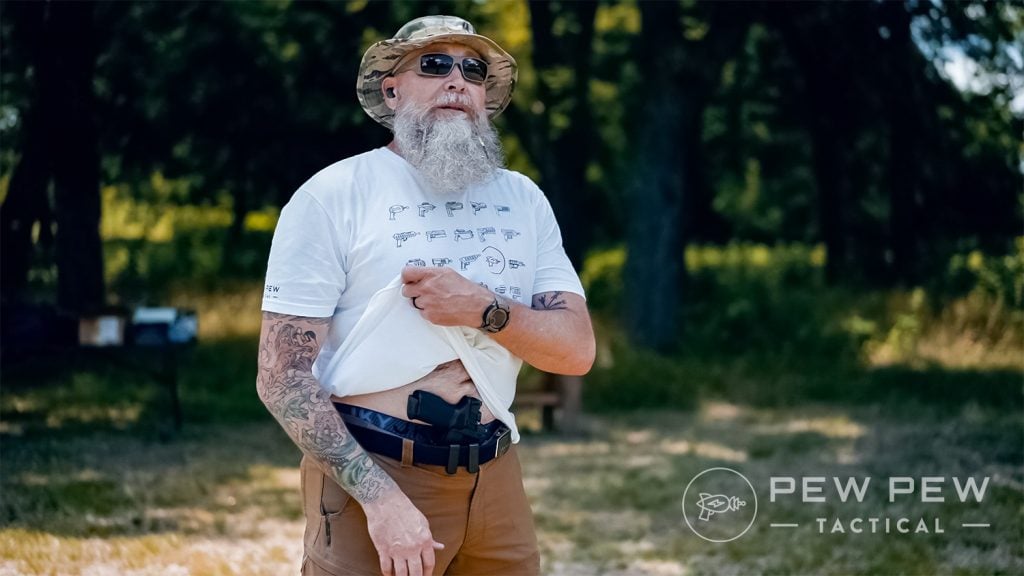
Prohibited Places
Even though open carry and concealed carry (with or without a Pistol Permit that is good statewide) are widely allowed, there are still places where you cannot carry a firearm. Specifically, Alabama prohibits carrying any firearm:
- At the Alabama State House
- While participating in or attending any public demonstration
- Within 1000 feet of public demonstrations after being ordered to leave by a law enforcement officer
- Within any wildlife management area without a valid permit
Handguns are prohibited on or in:
- Private property without:
- The owner’s consent
- The lawful resident or tenant’s consent
- A valid Pistol Permit
- Any place that restricts unauthorized access or has notices prohibiting firearms
- Police, sheriff, or highway patrol buildings
- Prisons, jails, halfway houses, correctional facilities, or any other detention facility
- Facilities treating psychiatric, mental, or emotional disorders
- Courthouses, courthouse annexes, or District Attorney’s office buildings
- County commission or city council meeting places
- Primary offices of elected officials
- Facilities hosting school athletic events
- Buildings or facilities with security guards and other security features
- Any location prohibited by federal law
Other places also regularly ban firearms. These are determined on a case-by-case basis and don’t fall under state law. These places include:
- Hospitals
- Places of worship
- Gambling facilities
- Polling places
Alabama does allow you, a law-abiding gun owner, to transport a handgun in your vehicle on K-12 school premises if:
- It is unloaded
- It is in a secure wrapper
- You are actively transporting it
- From its place of purchase to your home or business
- Between a gunsmith and your home or business
- While moving from your old home or business to your new one
Pistol Permit holders can legally carry concealed at sites hosting school athletic events if they have permission from the owner or person in charge of the facility.
If you are visiting a state and local government building, a school athletic events site, or a building or facility with security guards, you may keep your gun in your vehicle if:
- You have permission from someone with authority over the premises
- Your guns are kept out of sight and stored in a legal manner inside your vehicle
It is perfectly legal to carry guns openly or concealed in national parks or national forests if you abide by state law. That said, you cannot carry in visitor centers, ranger stations, offices, or maintenance buildings, since these are all technically federal buildings.
If you do happen to visit a prohibited place, just leave your handgun in the car in accordance with state transportation storage laws.
Getting Your Pistol Permit
Alabama sheriffs have a good bit of influence over the Pistol Permit process and validity. Always check with your sheriff’s office before starting the permit application process to avoid any unnecessary headaches.
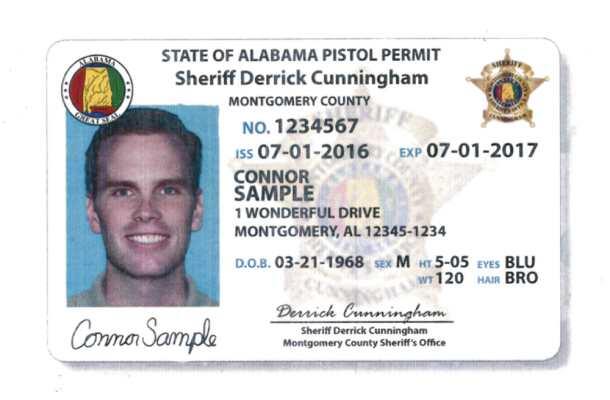
To apply for an Alabama Pistol Permit, you must:
- Be a legal resident of Alabama
- Be at least 19 years old (or 18 if you are a law enforcement officer, active duty military, a retired or honorably discharged veteran, or a military spouse)
- Not be prohibited from owning a firearm
- Have money to cover the application fee (amount varies by county)
When applying for your permit, you will need to know how long you want it to be valid. Alabama offers permits that are good for:
- 1 year
- 5 years
- A lifetime (only after first holding a valid permit for five years)
Alabama state law does not require any specialized training to apply for a Pistol Permit.
The Waiting Game
Once you’ve got everything squared away, you will need to submit your application to the sheriff’s office. Some counties allow you to submit your application online. You’ll submit your application and pay the fee.
Each county’s wait time varies, but you should hear within 30 days of submitting your application whether it was approved or denied. During that time, the sheriff’s office will conduct a background check and determine if you are eligible for a permit.
If you are denied, you will receive a detailed written notification. You then have the option to appeal the decision in the county’s district court. The sheriff can deny the permit if he or she believes you have:
- Been found guilty, found not guilty, and pled not guilty of a crime due to insanity or mental illness under civilian or military law
- Been found incompetent to stand criminal trial
- Required involuntary psychiatric treatment for any reason, including for
- Being a danger to yourself or others
- For drug use
- Violated firearms law or been found incompetent to possess a firearm
- Lied on your application
- Provided justifiable reason to be considered a concern to public safety
Along those lines, even if you have already been issued a permit, the sheriff can suspend or revoke your Pistol Permit if he or she does not believe you still meet all permit requirements.
Since Alabama is a shall-issue state, your sheriff must issue you a Pistol Permit if you meet all the requirements (and have filled out your application correctly).
Any Pistol Permit Exceptions or Loopholes?
Constitutional carry is the biggest exception to any concealed carry permitting requirement. Alabama has no other Pistol Permit exceptions or loopholes.
Renewing Your Pistol Permit
To renew a Pistol Permit, you must begin the process before it expires. You will need to mail in or walk in your old permit to your county sheriff’s office, complete a renewal application, and pay a renewal fee.
If you move to a different county and want to renew your old Pistol Permit, you will need to apply for a brand-new permit in your new county of residence.
Reciprocity
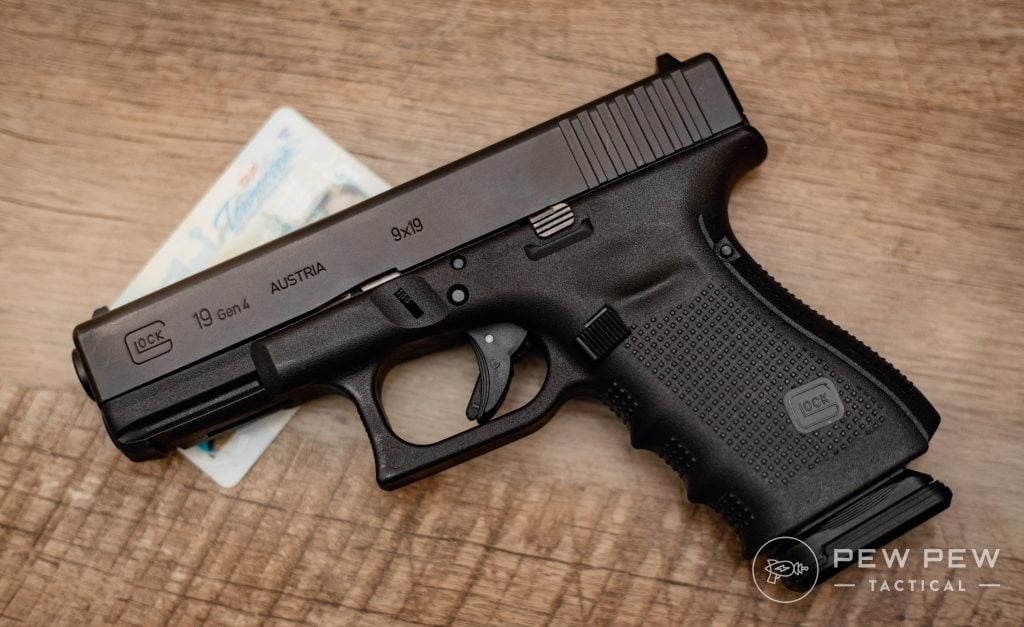
Most states allow Alabama Pistol Permit holders to carry concealed, although this is more due to constitutional (permitless) carry laws on the books rather than official reciprocity.
The age of eligibility varies by state, and the laws for permitless carry may differ from regular concealed carry laws, even within the same state.
North Carolina, a non-constitutional carry state, recognizes Alabama Pistol Permits without restrictions. Colorado, Michigan, Pennsylvania, Wisconsin, and Virginia also recognize Alabama Pistol Permits; however, they have additional restrictions that you will need to know before carrying there.
While most states recognize Alabama’s Pistol Permit (or don’t care about permits at all), there are still some that do not. A Pistol Permit is not recognized in:
- California
- Connecticut
- Delaware
- Hawaii
- Illinois
- Maryland
- Massachusetts
- Minnesota
- Nevada
- New Jersey
- New Mexico
- New York
- Oregon
- Rhode Island
- Washington
- Washington D.C.
Note: You’ll want to take a look at our state gun law guides for whichever state you’re planning on visiting, just to familiarize yourself with the gun laws on carrying while out there, and be aware of the differences you might need to be careful of.
Always check the law in the state you’re traveling to before you carry there.
Carry Laws for Out-of-State Visitors
For those of you who already have CCW permits from other states, Alabama has you covered. The state recognizes every valid out-of-state permit.
Alabama’s constitutional carry law requires you to be 19 or older to carry without a permit, but it does not explicitly require you to be an Alabama resident. The only other requirement (with or without a permit) is that you abide by the state’s gun laws.
Transporting Your Guns
Alabama’s firearm transportation laws are fairly loose and apply to both state residents and visitors from other states. They also apply to both average gun owners and Pistol Permit holders.
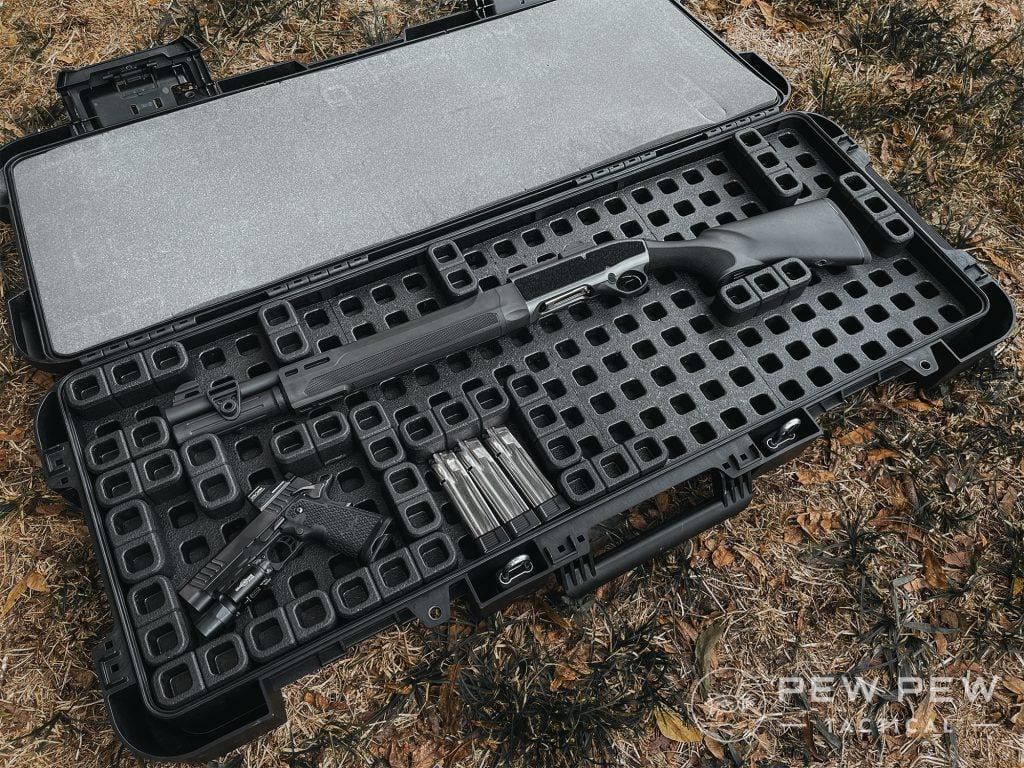
If you are pulled over for a traffic stop, you are only required to let the officer know you have a gun with you when specifically asked.
Transporting Long Guns
Your employer cannot prohibit or restrict you from keeping your legally owned long gun or ammunition in your private vehicle in the employer’s parking area if:
- You possess a valid Alabama hunting license
- Your long gun is unloaded at all times on company property
- It is hunting season
- You have never been convicted of a violent crime
- You are not subject to a domestic violence restraining order
- Your long gun is kept out of sight while you are with the vehicle
- While you are away from the vehicle, your handgun is kept out of sight and locked inside:
- The vehicle
- A locking interior compartment or container
- A container securely affixed to the vehicle
Transporting Handguns
Loaded handguns may be transported in any vehicle without a Pistol Permit.
Your employer cannot prohibit or restrict you from keeping your legally owned handgun or ammunition in your private vehicle in the employer’s parking area if:
- Your car is operated or parked only where it is allowed to be
- Your handgun is kept out of sight while you are with the vehicle
- While you are away from the vehicle, your handgun is kept out of sight and locked inside:
- A locking interior compartment or container;
- A container securely affixed to the vehicle; or
- The vehicle itself.
Self-Defense/Use of Force
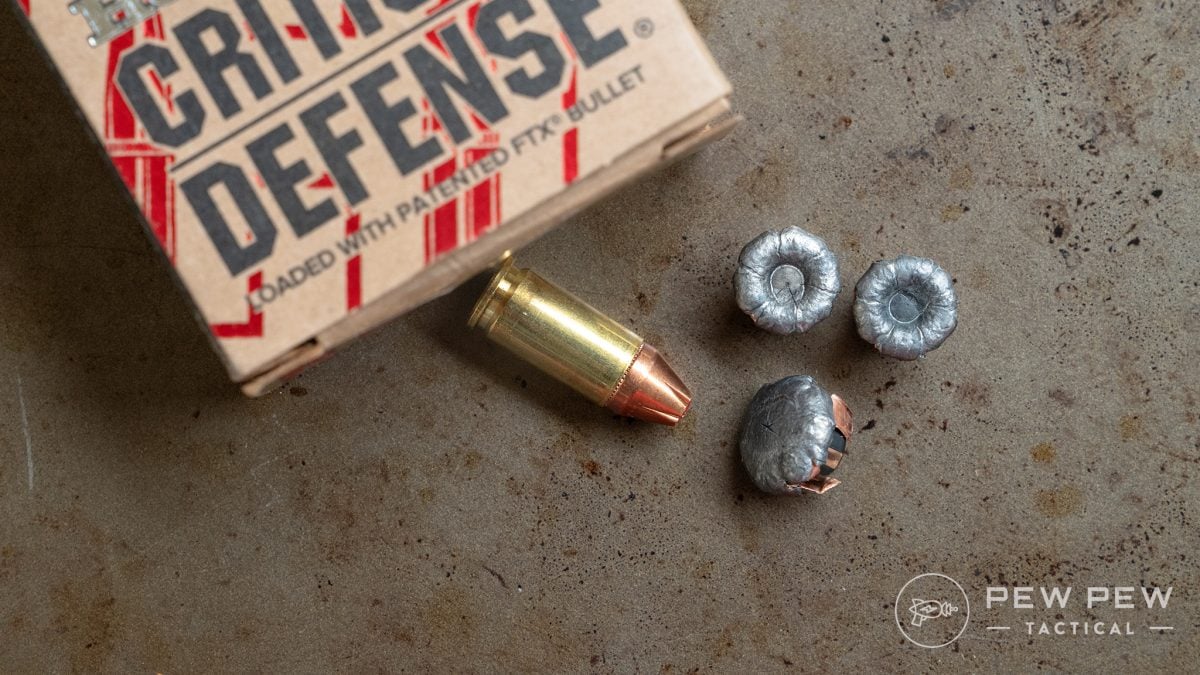
When Is Lethal Force Allowed?
Aside from practicing at the shooting range, you hopefully will never need to fire your guns. If you are ever faced with a deadly threat to yourself or others, however, Alabama does allow for the use of deadly force in certain circumstances. That said, your use of force must always be proportional to the threat.
Lethal force is illegal when protecting your physical belongings or property, unless you:
- Are defending another person according to Alabama’s Castle Doctrine and Stand Your Ground law; or
- Reasonably believe that it is necessary to prevent first or second-degree arson.
Castle Doctrine
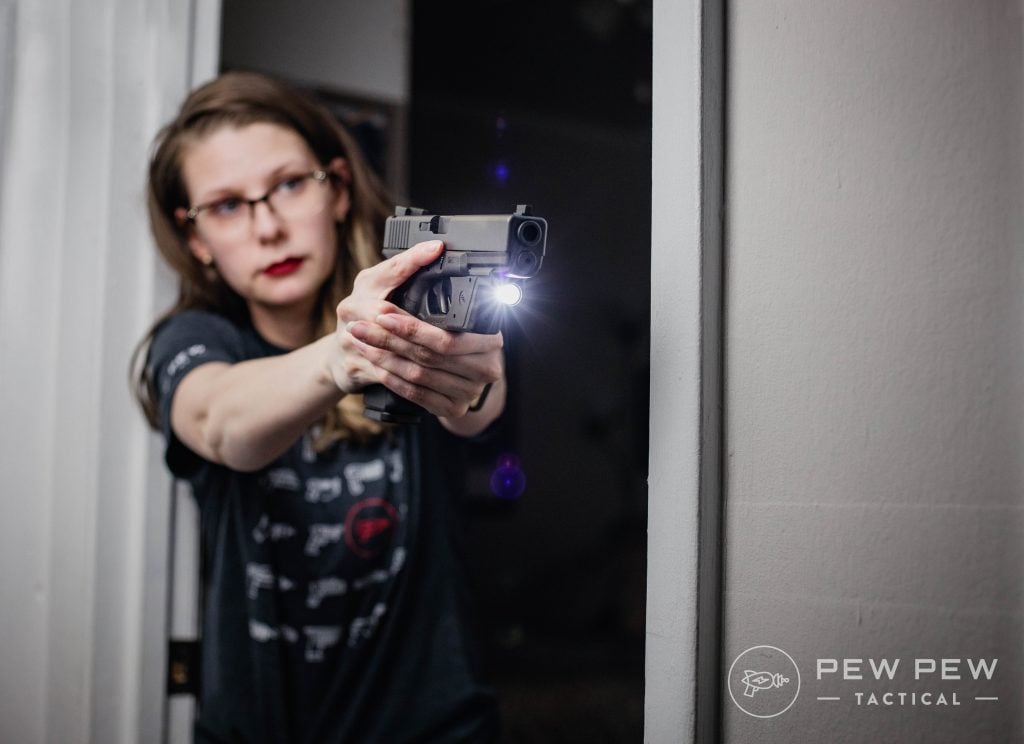
In Alabama, your home is your castle. Under what is commonly known as the “Castle Doctrine,” you can defend yourself when you’re at home or on your property. You are justified in using physical force, including deadly physical force, against an aggressor when you reasonably believe lesser force is inadequate and that an aggressor is:
- Using or about to use unlawful deadly physical force
- Using or about to use physical force against someone in their home during an actual or attempted burglary
- Committing or about to commit kidnapping, burglary, robbery, forcible rape, or forcible sodomy
- Using or about to use physical force against an owner, employee, or other authorized person when a business is closed while committing or attempting to commit a crime involving death, serious physical injury, robbery, kidnapping, rape, sodomy, or a crime of a sexual nature involving a child under the age of 12 and you or have reason to believe the aggressor is engaged in the act
- In the process or has unlawfully and forcefully entered a dwelling, residence, business property, or occupied vehicle, or federally licensed nuclear power facility and you or have reason to believe the aggressor is engaged in the act
- Attempting to remove or has removed a person against his or her will from any dwelling, residence, business property, or occupied vehicle when the person has a legal right to be and you or have reason to believe the aggressor is engaged in the act.
An “aggressor” in either of the last two situations is legally protected if:
- The “aggressor” is in their home, their vehicle, or a place where they have a right to be unless they are under a domestic violence protection injunction or a written pretrial no-contact order
- The “aggressor” has legal guardianship of a child they are attempting to remove from the premises
- The “aggressor” is a law enforcement officer acting in an official capacity
- You are already engaged in illegal activity
In other words, if someone breaks into your home and is about to commit a crime against anyone on the premises, and you think that person will use deadly physical force against you, Alabama recognizes your right to defend yourself with deadly force.
You cannot claim self-defense of any kind if you:
- Provoked a fight that you knew would cause the aggressor to use unlawful physical force
- Were the initial aggressor and failed to withdraw from the situation before it escalated and clearly communicated your withdrawal
- Illegally agreed to the fight ahead of time (such as a duel or gang fight)
- Are resisting arrest.
Standing Your Ground/Duty to Retreat
Alabama is a Stand Your Ground state that protects your right to self-defense in any place where you have the right to be. That said, the use of force must be proportional to the threat.
When using lethal force, you must reasonably believe that lesser force is inadequate and that an aggressor is:
- Engaged in any illegal activity covered under the state’s Castle Doctrine (see above), or
- Sabotaging or attempting to sabotage a federally licensed nuclear power facility and you or have reason to believe the aggressor is engaged in the act, unless:
- The “aggressor” has a right to be in that locationThe “aggressor” is a law enforcement officer acting in an official capacity
- You are already engaged in illegal activity
Once again, you cannot claim self-defense of any kind if you:
- Provoked a fight that you knew would cause the aggressor to use unlawful physical force
- Were the initial aggressor and failed to withdraw from the situation before it escalated and clearly communicated your withdrawal
- Illegally agreed to the fight ahead of time (such as a duel or gang fight)
- Are resisting arrest.
Of course, even with all these laws on self-defense, you should always use your best judgment to decide what type of force is appropriate. Just because you are allowed to use deadly force doesn’t mean you have to.
Taking any life is always a serious decision and may not always be necessary in order to end a threat to you and your loved ones.
Final Thoughts
And on that happy note, we’re done! If you’re lucky enough to live in the Yellowhammer State, it’s time to buy a gun (or three). Buy as many as you can and start punching holes in paper!
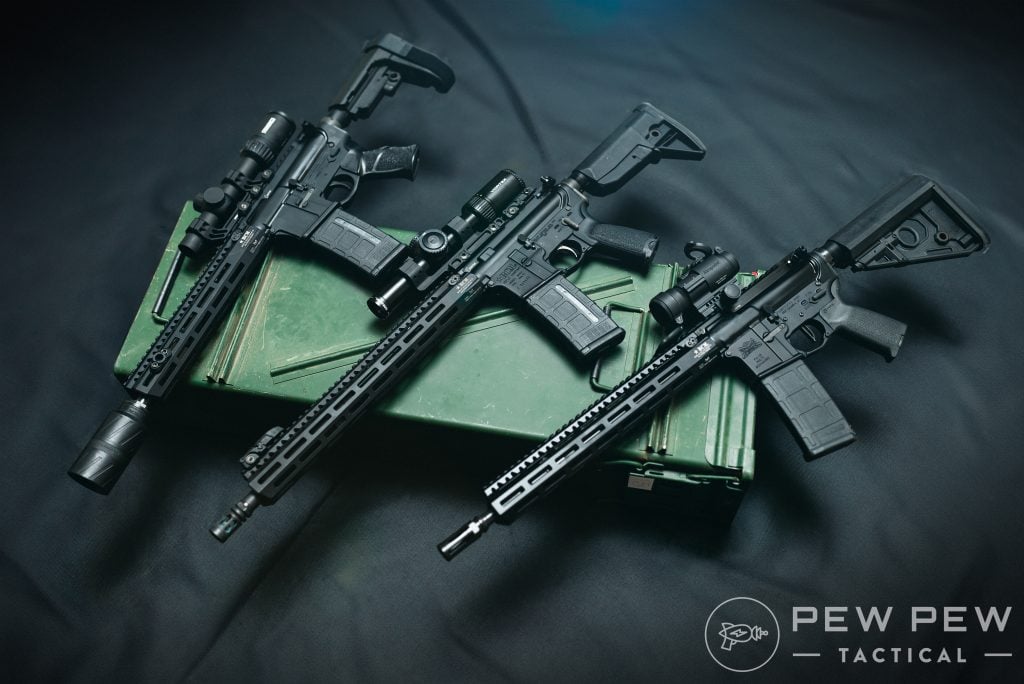
Of course, you’ll need a place to store all those guns. A sturdy safe can keep your guns from prying eyes and curious kids. If you want to start smaller, a gun cabinet, or even just a decent handgun safe may be a good investment. Getting proper training with your firearms is a good idea, too. Happy shooting!




